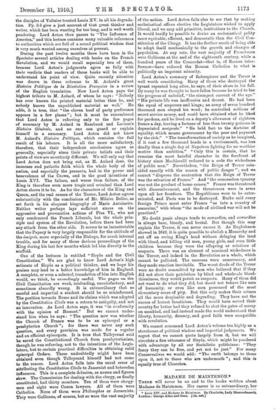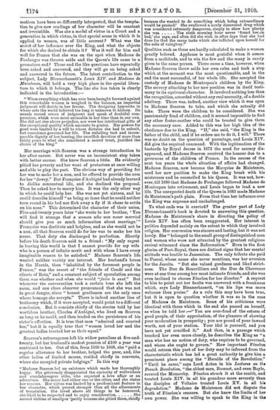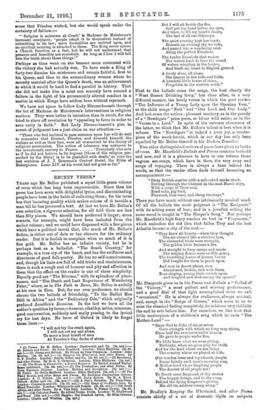MADAME DE MAINTENON.'
TILERS will never be an end to the books written about Madame de Maintenon. Her career is so extraordinary, her • Louis //Y. and Madame de Maintenou. By Charlotte, Lady Blennerhassett, London George Allen and Sass. 115s. sista motives have been so differently interpreted, that the tempta- tion to give new readings of her character will be constant and irresistible. Was she a model of virtue in a Court and a generation in which virtue, in that special sense in which it is applied to women, was of little account P What was the secret of her influence over the King, and what the objects for which she desired to obtain it P Was it well for him and well for France that she was on the spot when Madame de Foulanges was thrown aside and the Queen's life came to a premature end P These and the like questions have repeatedly been asked and answered, and they will go on being asked and answered in the future. The latest contribution to the subject, Lady Blennerhassett's Louis in-. and Madame de Maintenon, will hold a very high place in the special litera- ture to which it belongs. The line she has taken is clearly indicated in the introduction :— " When everything which has ever been brought forward against this remarkable woman is weighed in the balance, an impartial judgment will decide in her favour. The designing hypocrite in whose arts the world believed too long is unknown to history. Its annals record errors of judgment and speak of doubtful com- promises, which were more excusable in her time than in our own. She did not rise above prejudice, nor were her intellectual gifts of the exceptional quality which amounts to genius. Her powers for good were limited by a will to whose dictates she had to submit, but conscience governed her life. The unfailing tact and incom- parable dignity of her bearing, the unselfish devotion of more than thirty years to what she considered a. sacred trust, justified the choice of the king."
Her marriage with Scarron was a strange introduction to her after career. But never was an inconsistent step taken with better excuse. She knew Scarron a little. He evidently pitied her poverty and her want of protectors at once willing and able to play the part. The obvious way of providing for her was to make her a nun, and he offered to provide the sum for her "dowry." But Franeoise d'Aubigne had already learned to dislike conventual life, and she declined the proposal. Then he asked her to marry him. It was the only other way in which he could help her. She was not yet sixteen, and he could describe himself "as being so lame that he could neither turn round in his bed nor flick away a fly if it chose to settle on his nose." This determined the character of their union. Five-and-twenty years later "she wrote to her brother, You will find it strange that a woman who was never married should give you so much information about marriage." Franeoise was destitute and helpless, and as she would not be a nun, all that Scarron could do for her was to make her his nurse. That duty she discharged to perfection. Shortly before his death Scarron said to a friend : "My only regret in leaving this world is that I cannot provide for my wife who is a person of infinite merit and with whom I have every imaginable reason to be satisfied." Madame Scarron's life wanted neither variety nor interest. Her husband's house in the Marais, then " inhabited by the foremost people in France," was the resort of "the friends of Conde and the clients of Retz," and a constant subject of speculation among them was whether and when she would "faire le saut." But whenever the conversation took a certain tone she left the room, and one close observer pronounced that she was not in great danger, since " honest gentlemen are the only ones whose homage she accepts." There is indeed another line of testimony which, if it were accepted, would point to a different conclusion. But it consists chiefly of the stories told by her worthless brother, Charles d'Aubigne, who lived on Scarron as long as he could, and then traded on the persistence of his sister's affection. It is true that men "admired and courted her," but it is equally true that "women loved her and the greatest ladies treated her as their equal" Scarron's extravagance left his widow penniless at five-and- twenty, but her husband's modest pension of 2100 a year was continued to her. Out of this, from 1660 to 1668, she "paid a regular allowance to her brother, helped the poor, and, like other ladies of limited means, resided chiefly in convents, where she occupied private lodgings." In this way "Madame Scarron led an existence which made her thoroughly happy. She grievously disappointed the curiosity of wellwishers and scandalmongers alike, who expected a love affair or an adventure. She never had either ono or the other, and she states her reasons. Her virtue was backed by a predominant feature in her character, which proved stronger than all the allurements of temptation. She loved above all things to be honoured,
she liked to be respected and to enjoy consideration. She nursed victims of smallpox 'partly because she pitied them, chiefly because she wanted to do something which being extraordinary would be praised.' She swallowed a newly discovered drug which was considered extremely dangerous, simply to show how plucky
she was The sixth morning hour never found her an bed,' she says, and often did she wish in after days that she had done for God the many tasks which she inflicted upon herself for the sake of vainglory."
Qualities such as these are hardly calculated to make a woman greatly beloved. Applause is most grateful when it comes from a multitude, and to win the few and the many is rarely given to the same person. There came a time, however, when Madame Scarron threw aside her own rules and took a step which at the moment was the most questionable, and in the end the most successful, of her whole life. She accepted the custody of Madame de Montespan's children by the King. The secrecy attaching to her new position was in itself testi- mony to its equivocal character. It involved nothing less than the recognition, accorded without any real necessity, of a double adultery. There was, indeed, another view which it was open to Madame Scarron to take, and which she actually did take. There were the children to be considered. She was passionately fond of children, and it seemed impossible to find any other foster-mother who could be trusted to give them the necessary care. Added to this was her high idea of the obedience due to the King. "If," she said, "the King is the father of the child, and if he orders me to do it, I will" There was no doubt on the question of parentage, and Louis XIV.
did give the required command. With the legitimation of the bastards by Royal decree in 1673 the need for secrecy dis- appeared, and Madame Scarron received the honour due to a governess of the children of France. In the course of the next ten years the whole situation of affairs had changed. Madame Scarron, now become the Marquise de Maintenon, used her new position to make the King break with his mistresses and be reconciled to his Queen. It was not, how- ever, till 1680 that Madame de Foulanges followed Madame de Montespan into retirement, and Louis began to lead a new life. The unexpected death of the Queen in 1683 made Madame de Maintenon's path plain. From that time her influence over the King was supreme and unchallenged.
To what ends was it exerted P The greater part of Lady Blennerhassett's book is devoted to answering this question. Madame de Maintenon's share in directing the policy of Louis XIV. has often been exaggerated. Her interest in politics depended mainly on the extent to which they involved religion. Her conversion was sincere and lasting, but it was not lovely. She "belonged to the small group of distinguished men and women who were not attracted by the greatest religions revival witnessed since the Reformation." Even in the first glories of Port-Royal, there are distinct signs that her mental attitude was hostile to Jansenism. The only tribute she paid to Pascal, whose name she never mentions, was her aversion for the Jesuits. " But she valued goodness and liked strict- ness. The Duo de Beauvilliers and the Due de Chevrense were at one time among her most intimate friends, and she was even inclined to choose Fenelon for her director." A request to him to point out her faults was answered with s. frankness which, says Lady Blennerhassett, "on his lips was more welcome than praise." As a rule this may have been true, but it is open to question whether it was so in the case of Madame de Maintenon. Some of his criticisms were identical with those which in the end she passed on herself, as when he told her :—" You are over-fond of the esteem of good people, of their approbation, of the pleasure of showing your moderation in prosperity ; you are proud of your inward worth, not of your station. Your idol is yourself, and you have not yet crucified it." And then, in a passage which touched her even more closely, he describes the King as "a man who has no notion of duty, who requires to be governed, and whom she ought to govern." How important Fenelon would esteem this part of her duty may be inferred from the characteristic which has led a great authority to give him a prominent place among the " Heralds of the Revolution." " Until he came," says Lord Acton in his Lectures on the French Revolution," the ablest men, Bossuet, and even Bayle, revered the Monarchy. Fenelon struck it at the zenith, and treated Louis XIV. in all his grandeur more severely than the disciples of Voltaire treated Louis XV. in all his degradation." Madame de Maintenon did not dispute the truth of Fenelon's censure. But she knew the limits of her own power. She was willing to speak to the King in the sense that Fenelon wished, but she would speak under the certainty of failure:-- " Religion is unknown at Court,' is Madame de Maintenon's incessant complaint; 'people adapt it to themselves instead of submitting to its law; mere formalities are insisted upon, and no spiritual meaning is attached to them. The King never misses a Church function or a fast, but he will not understand that penance and humility are essentials. As long as I live I will tell him the truth about these things:" Perhaps as time went on she became more contented with the victory she bad actually won. To have made a. King of forty-two dismiss his mistresses and remain faithful, first to his Queen, and then to the extraordinary woman whom he secretly married after the Queen's death, was an achievement to which it would be hard to find a parallel in history. That she did not make him a saint can scarcely have seemed a failure in the light of his permanently altered conduct in a matter in which Kings have seldom been without reproach.
We have not space to follow Lady Blennerhassett through the list of Madame de Maintenon's interventions in religions matters. They were better in intention than in result, for she tried to stave off revolution by "appealing to force in order to save unity in faith." But Lady Blennerhassett's plea in arrest of judgment has a just claim on our attention :— " Those who feel inclined to pass sentence upon her will do well to remember that Bossuet, Fenelon, and Arnauld himself, the victims as well as their foes, were all committed to the theory of religious persecution. The notion of tolerance was unknown to the seventeenth century in France. . . . . . 'Everybody who acts as if he did not believe in its dogmas [those of the religion pre- scribed by the State] is to be punished with death,' so runs the last sentence of J. J. Rousseau's Contra Social, the Bible of Robespierre. Louis XIV. at his worst had not gone so far."








































 Previous page
Previous page